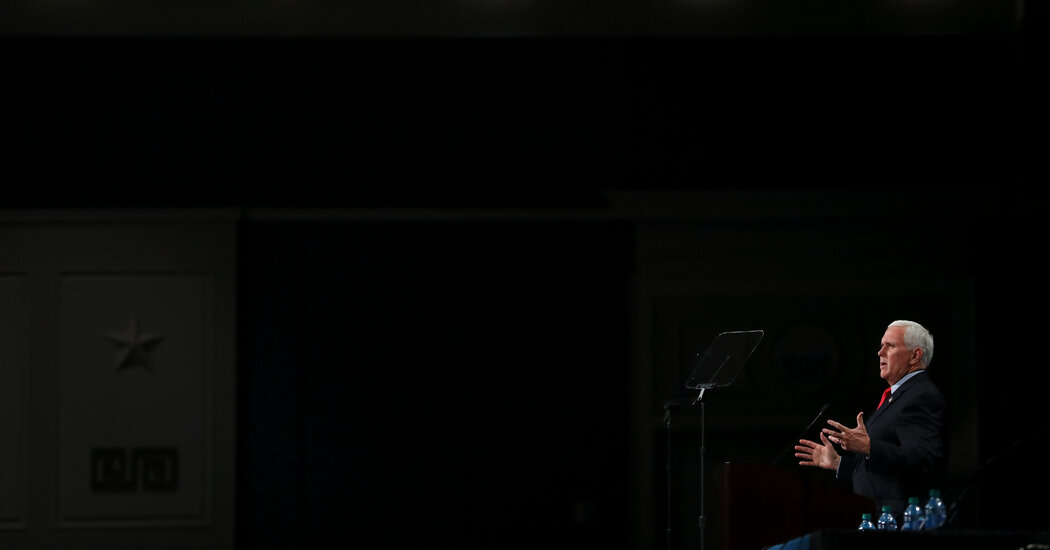
Former Vice President Mike Pence on Friday offered his most forceful rebuke of Donald J. Trump, saying the former president is “wrong” that Mr. Pence had the legal authority to change the results of the 2020 election and that the Republican Party must accept the outcome and look toward the future.
Speaking to a gathering of conservatives near Orlando, Fla., the former vice president said he understands “the disappointment so many feel about the last election” but repudiated Mr. Trump’s false claims that Mr. Pence could reject the Electoral College results and alter the outcome last year.
“President Trump is wrong,” said Mr. Pence, in his remarks before the Federalist Society, a conservative legal organization. “I had no right to overturn the election.”
The comments marked the strongest rejection of Mr. Trump’s efforts to overturn the 2020 election by his former vice president. Mr. Pence refused to give in on Jan. 6 to Mr. Trump’s pressure campaign to change the results. Since then, he has remained relatively quiet about that decision, largely declining to directly attack Mr. Trump or assign him any blame for inciting the deadly siege on the Capitol. In public appearances last year, Mr. Pence defended his role in resisting Mr. Trump but did not go further than saying that the two men will never “see eye to eye about that day.”
But tensions between them have been rising in recent days. As Mr. Pence positions himself for a possible presidential bid in 2024, Mr. Trump has pushed more intensely a false narrative aimed at blaming his former vice president for failing to stop President Biden from taking office.
Mr. Pence cast his opposition on Friday as larger than the immediate political moment, implying that the false claims pushed by Mr. Trump and his followers threatened to undermine American democracy.
“The truth is there’s more at stake than our party or our political fortunes,” he said. “If we lose faith in the Constitution, we won’t just lose elections — we’ll lose our country.”
In a speech that largely focused on attacking the policies and record of the Biden administration, Mr. Pence described Jan. 6 as a “dark day” in Washington. Such a description runs counter to an attempt by some on the right to rewrite history by describing the siege as a peaceful rally and by calling the rioters “political prisoners.” And he urged Mr. Trump and his party to accept the results of the last election.
“Whatever the future holds, I know we did our duty that day,” Mr. Pence said. “I believe the time has come to focus on the future.”
But Mr. Pence stopped short of completely breaking with the right-wing base that remains deeply influenced by Mr. Trump.
Mr. Pence did not explicitly say that Mr. Trump lost the election and he declined to address the false claims of election fraud still being pushed by the former president and his supporters. The carefully constructed wording of his rebuke shows an effort by Mr. Pence to defend his own actions on Jan. 6, while not completely alienating a Republican base that remains animated by conspiracy theories of a stolen election. Their support could be crucial in any 2024 primary contest.
His comments came just hours after the Republican Party voted to censure two Republican lawmakers for taking part in the House investigation of the Jan. 6 attack. The lawmakers, Representatives Liz Cheney of Wyoming and Adam Kinzinger of Illinois, were censured for participating in what the party’s resolution described as the “persecution of ordinary citizens engaged in legitimate political discourse.”
In a rambling statement issued Friday evening, Mr. Trump refrained from sharply attacking Mr. Pence. But he described Mr. Pence as being “an automatic conveyor belt” on Jan. 6 to “get Biden elected President as quickly as possible.” And he also did not back down from his assertion that Mr. Pence had the authority to change the results.
Mr. Trump added, “I was right and everyone knows it. If there is fraud or large scale irregularities, it would have been appropriate to send those votes back to the legislatures to figure it out.”
Legal scholars and officials from both parties say the vice president does not have the power to overturn elections. Mr. Pence agrees with that interpretation of the law: In a letter to Congress sent the morning of the Capitol attack, Mr. Pence rejected the president’s claims, writing that the Constitution “constrains me from claiming unilateral authority to determine which electoral votes should be counted and which should not.”
On Sunday, Mr. Trump falsely claimed that Mr. Pence could have “overturned the election” in a statement denouncing a bipartisan push to rewrite the Electoral Count Act of 1887. The former president and his allies misinterpreted that century-old law in their failed bid to persuade Mr. Pence to throw out legitimate election results. And on Tuesday, Mr. Trump said that the congressional committee investigating the role of his administration in the violent Jan. 6 attack on the Capitol should instead examine “why Mike Pence did not send back the votes for recertification or approval.”
Mr. Trump’s attempts to influence his vice president have become a focus of the House committee investigating the Jan. 6 attack, with some members seeing the participation of Mr. Pence’s team as vital to deciding whether it has sufficient evidence to make a criminal referral of Mr. Trump to the Justice Department. Two of Mr. Pence’s aides testified privately before the committee this week and Mr. Pence’s lawyer and the panel have been talking informally about whether the former vice president would be willing to speak to investigators.
The Justice Department has also been examining the ways in which Mr. Trump’s attacks on Mr. Pence influenced the mob. In recent plea negotiations in some Jan. 6 cases, prosecutors have asked defense lawyers whether their clients would admit in sworn statements that they stormed the Capitol believing that Mr. Trump wanted them to stop Mr. Pence from certifying the election.
As the attackers raided the Capitol that day, some chanted “Hang Mike Pence.” Mr. Trump initially brushed aside calls from aides and allies to call them off. Since then, Mr. Trump has defended the chants as understandable because, as he said in an interview with Jonathan Karl of ABC News, “the people were very angry” about the election.






